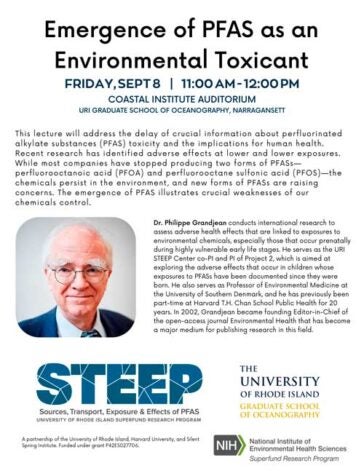
Date: Friday, September 8th
Time: 11:00am-Noon
Location: Coastal Institute Auditorium, Graduate School of Oceanography, Narragansett, RI
This lecture will address the delay of crucial information about perfluorinated alkylate substances (PFAS) toxicity and the implications for human health. Recent research has identified adverse effects at lower and lower exposures. While most companies have stopped producing two forms of PFASs— perfluorooctanoic acid (PFOA) and perfluorooctane sulfonic acid (PFOS)—the chemicals persist in the environment, and new forms of PFASs are raising concerns. The emergence of PFAS illustrates crucial weaknesses of our chemicals control.
 About Dr. Philippe Grandjean
About Dr. Philippe Grandjean
Dr. Philippe Grandjean conducts international research to assess adverse health effects that are linked to exposures to environmental chemicals, especially those that occur prenatally during highly vulnerable early life stages. He serves as the URI STEEP Center co-PI and PI of Project 2, which is aimed at exploring the adverse effects that occur in children whose exposures to PFASs have been documented since they were born. He also serves as Professor of Environmental Medicine at the University of Southern Denmark, and he has previously been part-time at Harvard T.H. Chan School Public Health for 20 years. In 2002, Grandjean became founding Editor-in-Chief of the open-access journal Environmental Health that has become a major medium for publishing research in this field.

